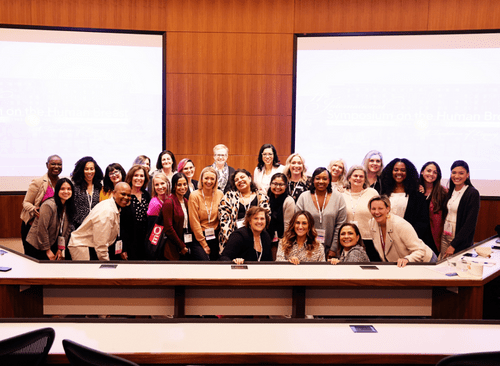
In February, as part of the 11th International Symposium on the Human Breast, there was a panel discussion led by and among patient advocates. One of the questions was simply “What makes someone an advocate?” It should be no surprise that a simple question has complicated answers!
The Oxford English Dictionary tells us that an advocate is one who “publicly supports or recommends a particular cause or policy.” During the panel discussion, the panelists shared some varying opinions on whether you need formal training to be considered an advocate, whether all advocacy had to include certain key elements (health policy or research or social media engagement for example), or even if you had to have a personal tie to the cause for which you were advocating.
Across the many hats I wear — clinician, researcher, non-profit leader, teacher, patient/woman — I think advocacy is a grayscale and that advocates are needed across the full spectrum. Let me explain. For most, advocacy begins with a personal call. They are diagnosed with breast cancer (or their mother, daughter, husband, son, partner, child, etc.) is diagnosed with breast cancer and they are motivated to advocate for themselves or their loved one. To learn how to find the basics online, how to communicate effectively with their care team, or navigate the healthcare system. In all likelihood, they do not recognize this as advocacy. They recognize this as survival. They are just doing what they need to do. However, gradually, as they move through the initial days, weeks, and months they find themselves listening and advising others because they have already been there. They find themselves curious about why things are subtly different story to story, case to case. Next, they find support groups and charitable organizations and conferences for survivors and metavivors… and the next thing you know, they realize they are in fact, a patient advocate.
Formal training programs for patient advocates like Project LEAD sponsored by the National Breast Cancer Coalition are amazing. But in truth, we need patient advocates embedded at every level of every cancer organization. One of the first patient advocates I ever worked with told me that one of the most impactful things she thinks she had ever done (mind you, this advocate has sat on multi-million dollar grant review committees) was get hooks put on the bathroom doors in her local cancer center because “Who wants to put their purse on the ground?” It is this simple, patient-centered eye to detail that patient advocates can bring to the table without any formal training at all. Any patient can share their experience in a letter to a congressman and make a difference. Patient advocates have often changed my perspective in as little as 280 characters reflecting on some random piece of science on Twitter without knowing the impact their words had on the way I understood the experience of living with breast cancer. Yet formally trained advocates have become some of the most powerful partners in clinical trial design, grant review for the National Cancer Institute and Department of Defense, or testifying on patient experience across a variety of issues on Capitol Hill to change policy that impacts everything from research funding to access to cancer care.
All of this is to say — I think everyone on the panel was right. They are all advocates. Advocacy can come in different shapes and sizes, but together, the richness of those differences will bring better care to everyone. And just like each advocate is at a different place on the grayscale of advocacy, each voice is being used for a slightly different cause. One advocate might be deeply committed to rural medicine whereas another champions triple negative breast cancer. One woman’s passion for pregnancy-associated breast cancer does not negate the work another does for male breast cancer. We need advocates of all ages, races, socioeconomic backgrounds, and ethnicities. We need pre-vivors and metavivors. Advocates for clinical trials, advocates for health insurance, advocates for cancer screening.
So, if I go back to the original question: “What makes someone an advocate?” The answer is simple: This unprecedented need. Healthcare needs each and every advocate to transform into the future.
